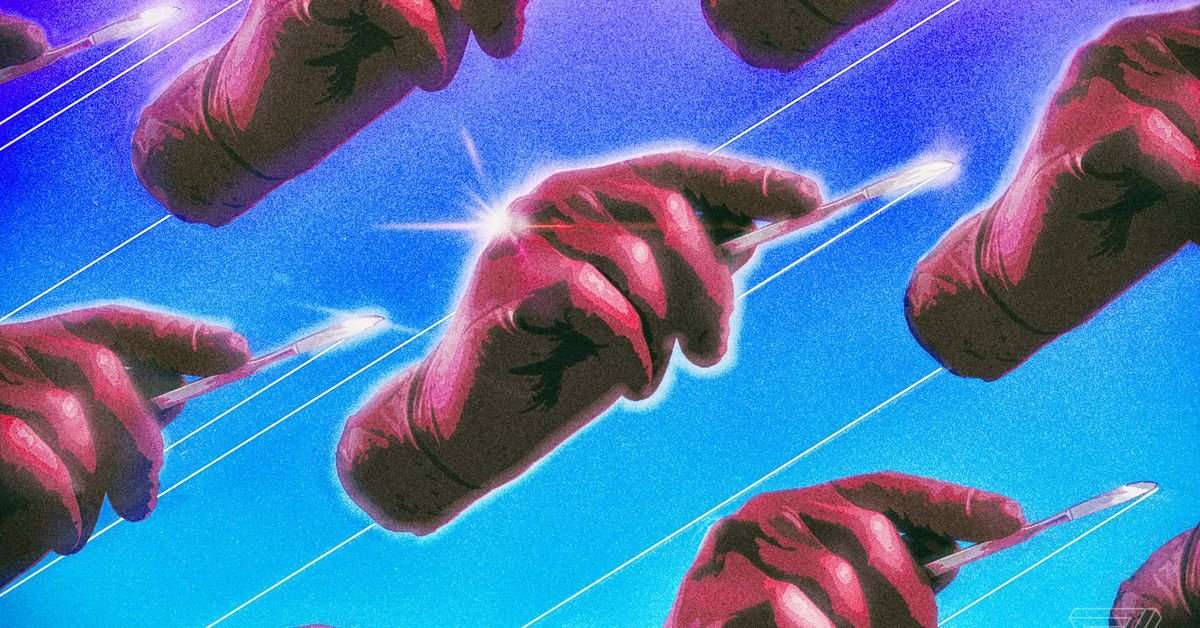A veteran of the US Armed Forces has a new penis and scrotum after the most extensive penis transplant yet, Johns Hopkins Hospital announced this week. Not included in the transplant? Testicles — because the testicles would continue to make the donor’s sperm in the transplant recipient’s body.
The patient, who asked Johns Hopkins not to reveal his name, suffered a devastating injury to his penis, testicles, part of his lower abdomen, and his legs in Afghanistan when an improvised explosive device blew up, The New York Times reports. A team of 11 surgeons replaced the injured flesh of his genitals and lower abdomen with tissue from a deceased donor during a 14-hour surgery at the end of March, and the patient is recovering well, according to a news briefing on Monday. But the transplant didn’t include testicles — something that the Johns Hopkins team decided early on was off the table, says Damon Cooney, a plastic and reconstructive surgery professor at the Johns Hopkins University School of Medicine.
While Cooney couldn’t discuss the particulars of the situation due to confidentiality, he said that generally people who lose their testicles opt to take testosterone to replace the hormones and receive testicular prostheses to restore the appearance. Technically a testicle transplant is possible, Cooney says, and would allow recipients to forego hormone replacement therapy.
But the problem is that the transplanted organ could produce the donor’s genetic offspring. And without the deceased donor’s consent, that poses an ethical complication that Johns Hopkins wanted to avoid from the outset. “If you were to transplant testicles, that would effectively be making the donor not only a donor of body parts, but also a donor of sperm,” says Jeffrey Kahn, director of the Johns Hopkins Berman Institute of Bioethics. “It’s effectively a sperm donation without consent — and that shouldn’t happen.”
To understand how that’s possible, it helps to know a little bit about the testicle’s plumbing. Early during an embryo’s development, the germ cells — which are basically the cellular grandparents or great grandparents of sperm — travel to the nascent gonads. These germ cells then divide to form stem cells that can produce more of themselves, and more of the cells that, through a series of divisions, make sperm. So, even if those testicles are transplanted into a new body, they’ll continue making sperm that carry the donor’s DNA, Michael Eisenberg, a urologist at Stanford University, explains.
“If someone using donated testicles was able to conceive a child, the genetic material would be from the donor,” Cooney says. “You can see why that raises ethical questions.”
Making sure that donors’ expectations align with reality is another reason why testicle transplants are off the table, at least for now. Most people who think of organ donation “think of donating their own tissues,” Cooney says. “They don’t think of donating genetic material that can be used to pass on genes to the next generation.”
The American Society for Reproductive Medicine has clear guidelines about this, explains Valarie Blake, an associate professor of law at West Virginia University. “They basically say don’t take reproductive material from a cadaver unless you have their consent,” she says. If the donor didn’t spell out permission in writing while still alive, the ASRM says that only the surviving spouse or partner can request that the sperm or eggs be harvested after death.
So without the donor’s permission during life, taking his testicles would have been especially appalling, Kahn says. “You’ve made that dead person a sperm donor without their knowing about it, so they could not have consented to it,” he says. “You’d cross a line: it’s not just restoring function — sexual and urinary function — you’ve granted a person the ability to reproduce, but with someone else’s gonads.”

Bad_Demon on April 27th, 2018 at 20:07 UTC »
So, what happens if you start making babies with random ladies? Dna test wont work if they want Child support.
ExhibitAa on April 27th, 2018 at 19:05 UTC »
"Hey, I need a header image for this article on testicle transplants."
"How about a bunch of flying disembodied hands holding scalpels?"
s_boli on April 27th, 2018 at 18:35 UTC »
TIL: Transplanted testicles